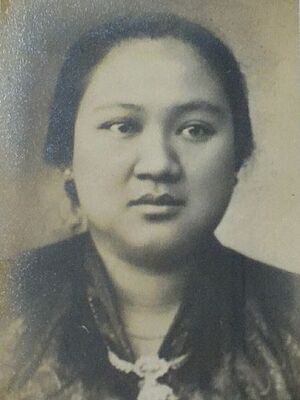Dewi Sartika facts for kids
Quick facts for kids
Dewi Sartika
|
|
|---|---|
 |
|
| Born | 4 December 1884 Tjitjalengka, Dutch East Indies (Now Cicalengka, Bandung Regency)
|
| Died | 11 September 1947 (aged 62) |
| Occupation | Teacher |
| Known for | Education for women |
| Spouse(s) | Raden Kanduruhan Agah Soeriawinata |
| Awards | National Heroes of Indonesia |
Dewi Sartika (born December 4, 1884 – died September 11, 1947) was a very important person in Indonesia. She worked hard to make sure girls could go to school. She started the very first school for girls in what was then called the Dutch East Indies. Because of her great work, she was named a National Hero of Indonesia in 1966.
Contents
Who Was Dewi Sartika?
Dewi Sartika was born in Cicalengka on December 4, 1884. Her parents, R. Rangga Somanagara and R. A. Rajapermas, were from a noble Sundanese family. This meant they were part of an important and respected family in their community.
Early Life and Dreams
Even as a young girl, Dewi Sartika loved to learn and teach. After her own school lessons, she would often play with her friends. During these games, she would pretend to be a teacher. She taught her friends what she had learned that day.
After her father passed away, Dewi Sartika went to live with her uncle. He made sure she learned about Sundanese culture. She also learned about Western culture from the wife of a local official. In 1899, she moved to the city of Bandung.
Founding a School for Girls
At that time, it was not common for girls to go to school. Dewi Sartika believed that girls deserved an education just as much as boys. She wanted to give them the chance to learn and grow.
So, on January 16, 1904, she opened her own school. It was called Sakola Istri, which means "Women's School." It started in a small part of the Bandung Regency's main building.
The school quickly became popular. In 1910, it moved to a new location on Jalan Ciguriang. Its name also changed to Sakola Kaoetamaan Isteri, meaning "School of Excellence for Women."
Dewi Sartika's dream spread across the region. By 1912, there were nine of these schools in different cities and areas of West Java. By 1920, almost every city and region had a school for girls. In September 1929, the main school was renamed Sakola Raden Dewi in her honor.
Her Last Years
Dewi Sartika lived through a time when Indonesia was fighting for its freedom. This period was known as the Indonesian War for Independence. Because of the fighting, she had to leave Bandung.
She passed away on September 11, 1947, in Cineam, Tasikmalaya. Later, her family decided to move her grave. She was reburied in Makam Para Boepati Bandung in Bandung.
Her Lasting Impact
Dewi Sartika's work changed the lives of many girls and women in Indonesia. Her dedication to education left a lasting mark on the country.
Awards and Recognition
Her efforts were recognized during her lifetime. On the 35th anniversary of her school, she received a special award called the Order of Orange-Nassau. This was a high honor given to her for her important work in education.
After her death, her legacy continued to be celebrated. On December 1, 1966, she was officially given the title of "Heroine of the National Movement." This title honors people who have made huge contributions to Indonesia.
A Personal Touch
In 1906, Dewi Sartika married Raden Kanduruan Agah Soeriawinata. He was also a teacher at a school called Sakola Karang Pamulang. This school trained people who wanted to become teachers themselves.
Modern Tributes
Even today, Dewi Sartika is remembered and honored. Many streets in Indonesia are named after her, including the street where her school once stood.
On December 4, 2016, Google celebrated her 132nd birthday. They created a special Google Doodle to show her picture and share her story with people around the world.
 | Kyle Baker |
 | Joseph Yoakum |
 | Laura Wheeler Waring |
 | Henry Ossawa Tanner |

